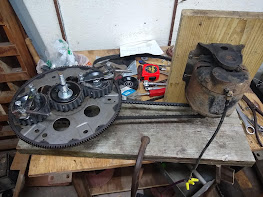PIETECH P.6 - Web Site Active, Manual is Ready, 3-planet System Testing, & Possible Changes to the Weights
The Web Site
The web site is
officially up and running! I am definitely not a web page builder, but thanks
to some awesome open source software (Open Element) and a very cost effective
web hosting company (https://www.hostens.com)
who also offer a suite of programs free with the service, www.stclairtech.tech is live.
Eventually this blog may migrate to the www.stclairtech.tech site.
The Manual
The PIE BUILDER’S MANUAL is complete as well and there are links to it from the stclairtech web site. I have listed
it on eBay either as a downloadable PDF formatted e-book or as a paper manual.
The paper manual also includes the downloadable version and they both come with
links to exclusive manual “companion videos”.
The PIE 4.3
The PIE 4.3 has the new motor installed, and the RPMs are
just where I expected them to be. The 24v motor is very strong and seems to do
a great job of maintaining a stable speed under load. I thought I was ready to
build the second wheel, but building the web site gave me some time to think.
There are some modifications and variations I want to explore and experiment with as the
building continues.
1st I definitely want to try an odd number of
planet gears. One gear works better than tow, so I need to see if that is going
to continue to change results as the number of gears increases.
2nd I want to add an electrical circuit to the
drive motor that can instantly vary the speed it runs. Since I know that if it
is allowed to slow when the weight is leaving the center and accelerating in
velocity (power stroke) the thrust is dramatically reduced, it stands to reason
that inverting this RPM drop into an RPM increase may lead to better results.
This could be somewhat accomplished with matching offset drive sprockets, but I
think that faster translations between speeds may be more effective….
3rd I want to increase the efficiency of the
weights… But how? The answer to this may have already been answered more than
85 years ago by Mr. Harry W. Bull of Syracuse, NY with a device he called the “Propulsor”. This led to an OMG moment...
OMG Moment:
The H.W. Bull “Propulsor”:
In January of 1935 Harry W. Bull of Syracuse NY was featured
in a Popular Science article for his invention known as a “Reaction Motor”
which came to be known as the “Propulsor”. This design uses 2 equal weights
that are slammed into opposite ends of a tube, one weight hits a solid stop
while the other hits a “spring” stop. This creates a differential in the
efficiency of the “stopping” of the weights. The solid hit creates sound and
heat as waste energies while the “spring” end transmits the directional force
more efficiently. Like the difference between a steel and a “dead-blow” hammer.
An interesting chapter in the professional life of Harry
Bull is available online at http://epizodsspace.airbase.ru/bibl/inostr-yazyki/iaa/1989/Winter_Harry_Bull_American_Rocket_Pioneer.pdf . On pages 308 & 309 of this volume of a
much larger book, the propulsor is briefly discussed.
Of course, Mr. Bull’s work with the Propulsor was
immediately rebuffed by the “scholars”
of the time and was publicly denounced as a “fallacious” in 1947, just as all
other attempts at a reactionless drive have been and still are today.
 |
| Harry W. Bull Pendulum Testing |
 |
| Basic Principal of Propulsor |
Back to PIE 4.3
What if the PIE’s weights were “dead-blow”? Since a
dead-blow hammer effectively transmits more force in every blow than a plain
hammer because it has almost no “bounce-back”, I think that a similar design
could be used for the weights which would then transmit their power more
effectively with less wasted energy. The reason it transmits power more
efficiently is because it lengthens the TIME the contact blow happens! Time, the
length of time that virtually any impulse drive uses to produce directional
force is a critical feature in successful operation!
 |
| 3-Planet System |
Currently the PIE 4.3 has the option of 2 or 3 planet gears. The 3-gear
design just makes sense to me, but testing will tell the story there. There is
a motor speed controller currently ordered and I am building more weights to
experiment with.
I have just begun testing the 3-planet set-up and
YouTube: https://www.youtube.com/watch?v=ii1l8W9-8nQ
BitChute: https://www.bitchute.com/video/5pmnbyhLKRcJ/

Comments
Post a Comment